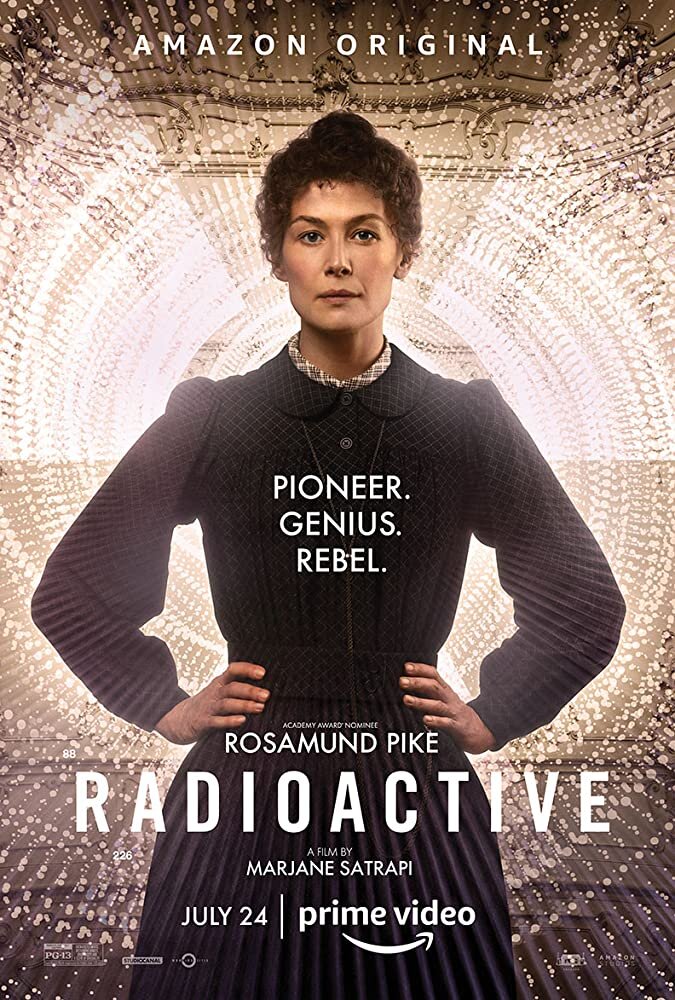Radioactive (2020)


SHOULD I SEE IT?
YES
Marie Curie deserves to have her story told to as wide an audience as possible, and Radioactive shares the details on the fascinating life of the groundbreaking scientist - the first woman to ever win a Nobel Prize and the first person to ever win it twice.
Rosamund Pike reminds how talented an actor she is, holding the film together as best she can with a steady, driven performance.
Director Marjane Satrapi has an ambitious concept for telling Curie’s story in a unique and thoughtful way.
NO
Intermittently anodyne and densely written, Radioactive struggles to find a lasting spark.
Falls victim to the traps many biopics stumble into…Radioactive sacrifices depth and power and serves as little more than a highlight reel of a significant life worth learning about.
The choppy editing, peculiar storytelling choices, and languid pace are next to impossible to ignore and/or overcome.
OUR REVIEW
There seems no time better than the present to tell a new generation about the remarkable life of Marie Skłodowska, later known to the world as Marie Curie. Polish-born in 1867, Skłodowska would go on to study mathematics, physics, and chemistry at the University of Paris in her twenties. Her work in studying the magnetic properties of steel would lead her on a path to eventually meet her future husband and scientific partner and collaborator, French physicist Pierre Curie.
Marie Curie’s drive and tenacity is somewhat encapsulated in Radioactive, a new film from Oscar-nominated filmmaker Marjane Satrapi (Persepolis). Satrapi is enamored in telling the story of the first woman to win a Nobel Prize who also became the first individual to ever win the recognition twice. Portrayed by Rosamund Pike (Gone Girl), Satrapi hangs nearly her entire film on the able shoulders of Pike, an actor clearly willing to perform the heavy lifting required. Talented as she is, Pike struggles to stay afloat in a dense, scattershot script from Jack Thorne (Wonder, The Aeronauts), adapting a 2010 graphic novel on Curie’s life by Lauren Redniss.
In her final hours, circa 1934, Curie collapses in Paris. While being rushed to the emergency room, she begins seeing her life in a series of flashbacks. This places us in the early 1890s, as Curie is developing into a scientist and physicist at university. Her research is often dismissed, in other times challenged. She is tasked with presenting findings and seeking funding for research to disinterested and disgusted all-male review boards. Seldom, if ever, do they take her seriously.
Upon meeting Pierre (Sam Riley), her life changes. They marry. Start a family. And together, they eventually pivot their attention to discovering the principles of radioactivity. Identifying radium and polonium will win them the Nobel Prize, though initially Marie Curie is impeded from recognition because she is a woman.
Throughout Radioactive, Pike and Riley play well opposite one another, though the screenplay largely portrays Pierre as something of a voice of reason, while Marie is a proverbial bull-in-the-china-shop when it comes to her proud nature and reluctance to take a back seat to anyone.

A handful of terrific moments play out here, but the film’s first half is hampered with long, expository conversations about things the general public likely know little to nothing about. Assumptions in Thorne’s script are frequent and the film seems to not have a stated interest in bringing people along into a deeper understanding of Curie and her work. A case could certainly be made that we all should know far more about Marie Curie than we do; many of us, however, simply don’t.
Haphazardly constructed, odd decisions like flash-forwarding to vignettes detailing historical events after Curie’s death which prove to be unforeseen circumstances of her work, make the film feel unduly burdensome to navigate. Though curious in their own unique way, these sequences remove us from any cadence or rhythm the film falls into.
Inconsistent editing and storytelling doom things rather quickly. In the opening minutes, Satrapi and editor Stéphane Roche rush through so many major points in the important and formative years of Curie’s life, it’s baffling then why we get stuck, languishing on exposition-rich dialogue which is highly scientific and difficult to follow at times.
When you have a subject like Marie Curie, the opportunities to draw parallels feel like obvious ones. As women are increasingly fighting for equal pay, equality in the work force, and the elimination of a toxic work environment, Curie fought against those biases much of her adult life.
Radioactive could have used history to inform our present. Instead, this Cliff's Notes version of Curie's life says a lot, without really saying anything meaningful at all.
CAST & CREW
Starring: Rosamund Pike, Sam Riley, Anya Taylor-Joy, Aneurin Barnard, Katherine Parkinson, Simon Russell Beale, Indica Watson, Cara Bossom, Tim Woodward, Demetri Goritsas, Sian Brooke, Edward Davis.
Director: Marjane Satrapi
Written by: Jack Thorne
Based on the graphic novel, “Radioactive: Marie & Pierre Curie: A Tale of Love and Fallout” by Lauren Redniss
Release Date: July 24, 2020
Amazon Studios/Amazon Prime Video
